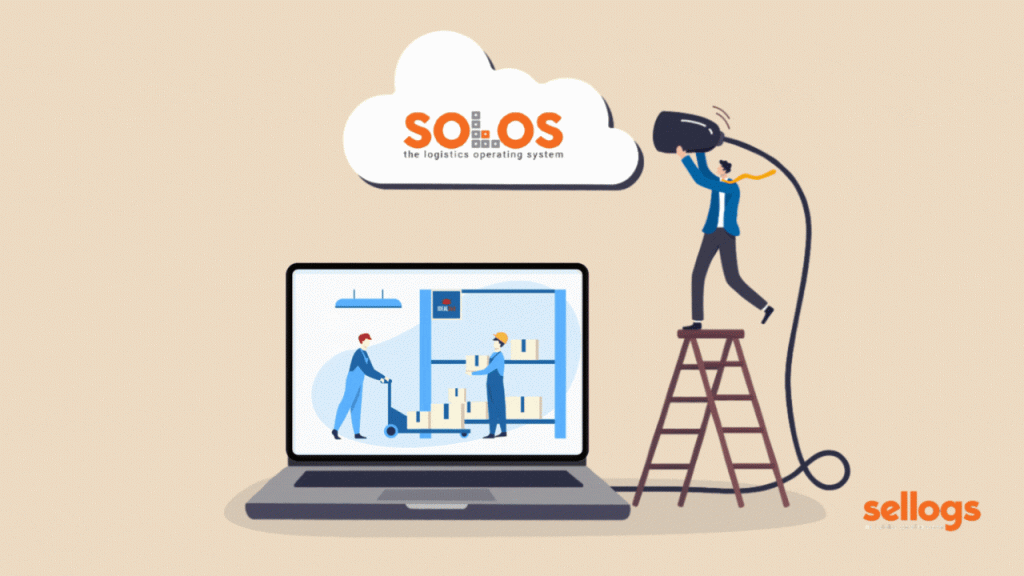DIGITIZATION OF SUPPLY CHAIN LOGISTICS

The world of logistics is entering a new era. The Supply Chain Industry is a crucial part of any organization. It involves the connection between various sectors, basically marketing, logistics, and production. The impeccable supply chain is vital for any organization’s success. Consistent escalating demand in supply, especially post-pandemic, has raised the requirement for innovation in the supply chain industry. With the implementation of modern technologies like Artificial Intelligence, Machine Learning, the Internet of Things, Blockchain, and Cloud Computing, the modern supply chain industry has adopted full automation processes. Bringing automation and digitization in the warehouse management and supply channels is very profitable to the organization as well as the customers. Digitization helps in building a completely integrated and transparent system for all the parties involved, starting from the raw material supplier, to the manufacturer, transporters, and the end customers. This article will discuss the methods that organizations have to implement for the digitization of their Supply Chain Logistics. What is supply chain Logistics? The supply chain is an ecosystem with coordinated activities to get a product from the manufacturer or supplier to the end customer, at the most possible cheaper rate safely and without delay. It is a network between the producer, transporter, and customer. According to Mastin Christopher, Emeritus Professor of Marketing and Logistics at Cranfield School of Management in Bedfordshire, England, “Supply chain is the network of organizations that is involved through upstream and downstream linkages in the different processes and activities that produce value in the form of products and services in the hands of the ultimate consumer”. The main function involves procurement of raw material, logistics, and transportation, demand forecasting of the products, merchandising, planning allocation, inventory generation, route mapping, on-time delivery, and last but not least customer service. The Key activities of a supply chain are:- Purchasing Production planning Material management. Transportation Customer Service Sales/Demand forecasting. Reversal Logistics. An adequate supply chain system helps to cut expenses, reduce wastage, and saves time. Automation in the supply chain helps supplies to be filled on time as it automatically signals the refilling order to the organizer. The warehouse or the retail shops can thus be restocked as soon as the products are sold. . Supply Chain Digitization The process of upgrading the analog supply chain process into an automated and digitized process by implementing modern technologies and software is the digitization of the supply chain. As the market size is predicted to double its size by 2030, the digitization of supply chain logistics is inevitable. It helps to place your organization in the Global Supply Chain. The result is a more responsive, agile, transparent supply flow, that can face the industry challenges such as inventory shortages, order modifications, lead time, better data reporting, and so on. The benefits of supply chain logistics automation are countless, reducing human resources, reducing paperwork, saving time and money, and enhancing productivity, and customer satisfaction. How do digitize the supply chain Logistics? The basic tools used for the digitization of the supply chain industry are Artificial Intelligence, the Internet of Things, Blockchain, Cloud Computing, Machine Learning, GPS, Electronic Data, Robotic Technologies, and the most advanced is the use of Drones. Internet, Electronic Data, Interchange, GPS, and Decision Support systems (DSS) are the technologies that were the game-changers. Cloud computing has brought about a revolutionary change in the supply chain industry. Robotic technologies help to cut down manual involvement and to enhance efficiency and save time and money in the long run. The collaboration of human resources, artificial intelligence, technologies, and software is the digitization motto. For upgrading to a digitized supply chain from a traditional supply chain successfully, all partners involved in various levels of the supply chain should pay attention to the core element of their process. A better understanding of the product demand and the customer needs a better transformational strategy, the needs of the organization that has to be taken care,e of, and getting proper and suitable tools for digitization. A perfectly customized digital strategy according to the organization’s needs, at less expense is the only way to achieve the best benefits of digitization of the system. The development partner should be resourceful enough to offer you the right solutions and technology that your organization needs to attain a higher level of responsiveness and innovation. Digitization completely automates the manual tasks, thus improving the supply chain operations, and reducing the mistakes and loss of time and money. A customized solution for your organization’s needs is the core of the successful digitization of your organization. Software that is integration friendly to your existing system helps to sustain the challenges in the market. The implementation of automation and digitization leads to the augmentation of the supply chain industry. Barcode technology and RFID are used in inventory management, transparent tracking, logistics, route mapping, and on-time delivery. SCM Software is inevitable in the digitized supply chain industry. It generates big data which is analyzed by Artificial Intelligence and it generates the needed signal for the smooth running of the operation. Implementing artificial intelligence helps in forecasting the product demand, which can be helpful for the manufacturers to produce as per need. It helps in saving loss of energy, resources, and money. The data of previous or historic sales cycles, product reviews, and competitive products in the market, website visits, help Artificial Intelligence to predict the market demand. The huge paperwork and manual involvement in the documentation and storage of information are avoidable by digitization. The artificial intelligence algorithm can store the database for later utilization. One of the impressive applications of artificial intelligence is the chatbot. It helps in answering the queries of the customers. All the frequently asked questions that customers asked about their orders, delivery, and tracking can be answered by the information stored, that contains the answers to the commonly asked question. Natural language processing is applied to bots, which gives a faster response and keeps customers satisfied. Digitization is also transforming the Reverse Logistics Supply Chain. It
State of Logistics-Tech-Product-Startups What Bloomed, What Bombed and What will Bear-On AC (After Covid)

Let me confess before I begin – I have the entrepreneurial “itch” which brings me back very often to beginnings of some business multiple times in life. When I left a comfortable position in a promising logistics tech startup 2 decades back, the founder gave me a piece of splendid advice – “If you want to be an entrepreneur, you should be ready for a lower quality of life”. Since then, in the past 2 decades, I have lived in the midst of Logistics Tech from the time we built the first netcentric ERP for Logistics Service Providers in 2002. Many Logistics Tech Startups have come, gone, and also stayed anchored with their business models which appealed to the user and made a positive change to his businesses. We will focus our discussion in this article to the Transactional, Decision Support, and Tech Leveraged Solutions in Logistics which made their appearance in business in the past decade. “You can only do so many things great, and you should cast aside everything else.” ~ Tim Cook, CEO of Apple and made the Apple Supply Chain what it is today. This is absolutely true when you analyze the trend in Logistics-Tech-Startups. 99% of these initiatives have focussed on their area of core competence, the background they came from, and the stream of specialization in logistics they focussed. We can segregate the startups whose founders are those who came from the Logistics (Sales, Consulting, Operations) Domain whom I would tag as DOERS and the Young breed of tech-savvy Ivy league Alumni who made their mark by building high valuation Entreprises – whom I would tag as DARERS. DOERS: People who came from the Ocean Carrier industry, built Demand Aggregation for Carriers. People who came from the Freight Forwarder background (All Modes) built Freight Exchanges, which morphed into Freight Aggregators and which is again morphing into Freight Sourcing Platforms. Who came from Warehousing background built Productivity tools for warehouses and Warehouse demand aggregation. Truck aggregators, Uberisation of Small trucks, Reverse Auction platforms, Freight Audit Platforms – Mostly those are EXECUTION in nature and TRANSACTIONAL in form and which reduces the effort of the operator or provides reduction of cost and increase in efficiency when applied. DARERS: In this segment of Founders, it is not the years of experience but the knowledge of technology and its application on some of the case studies in the Logistics Execution process which has helped them to create businesses around it. Mostly, they are either TRANSACTIONAL – TMS, FMS, WMS, or some elements of ERP interventions. Or They are more ANALYTICAL solutions catering to areas of Planning, Optimisation, Business Intelligence, Control Towers, IoT, Predictive Analytics, BlockChain ……. and the list can be really long. The solutions are aspirational – most of the solutions wanted to solve the problem of the world in Logistics and they took the best of tech and threw it on the Real-world problems of Logistics and came out with their version of solutions. The world of Tech Solutions in Logistics has grown and excelled. The investor community is quick to jump on any opportunity in such solutions segments – because they believe that the future is Supply Chain. Brilliant minds have woven exceptional solutions to specific problems and have built several siloed fields (read minefields) of solutions for the SERVICE USER (The One who pays for the Freight and Services). It is very pertinent to see WHY the service user is not waiting at the gates on a Black Friday to buy these solutions off the shelf and implement them. Maybe an old quote about Logisticians sums up the reason for us: My logisticians are a humorless lot … they know if my campaign fails, they are the first ones I will slay. Alexander-The-Great Well, this is true. Anyone who has served in that hot seat in an FMCG, Heavy Engineering, ECOM, Critical Care Pharma…etc will tell you that the above quote is not out of context. In my 3 decades of learning, talking, and teaching logistics, I would have spoken to a lot of Supply Chain Leaders from the Service User segment. All of them depend on their ERPs and MS Excels when they go to war every day to deliver their goals. They have proven techniques of how to use them and articulate them. They have won many Pay rises with these techniques. If you need them to change their technique, you need to get into their shoes and understand the fact that – You cannot be like the 5 blind men who touched an Elephant and described it as a tree trunk, tube, and a big tub. You need to open your eyes and see the Elephant as a whole.The Whole is Greater than the sum of the parts in Logistics Execution. So to see WHAT BLOOMED – All Applications, Solutions, and technology which offered “OWNERSHIP” of getting the outcome and delivering it. Digital Forwarding – Grew multiples in a short span of 3 years. It forced all traditional forwarders to adapt and follow. Digital forwarding brings speed and predictability to the job of a forwarder. It may, at times help to control costs. Return Load Optimisation, Reverse Auction Platforms, and Uber Models in Trucking – The Oldest case study in digitalization in the Logistics business. Brings Cost down, Sweats the asset more, gives more CHOICE to be buyer, offers QUICK turnaround of truck placement and the list goes on. These platforms have grown multiple times. Transaction Visibility APIs – Grew multi-fold. The solutions which offered synchronized tracking of a moving asset (Remote Asset Tracking), Visibility tracking of Cargo with APIs along the way of transit, Predictive ETA services, On-demand Location services. Slowly, this availability of on-demand data is becoming an addictive service to the Service User. Managed Services for Planning and BI. Services like Demand Planning, Supply Planning, S&OP support services, Control Towers, Freight Audits, et. The adoption is still at the Top 5% of the customer base. As technology becomes


















